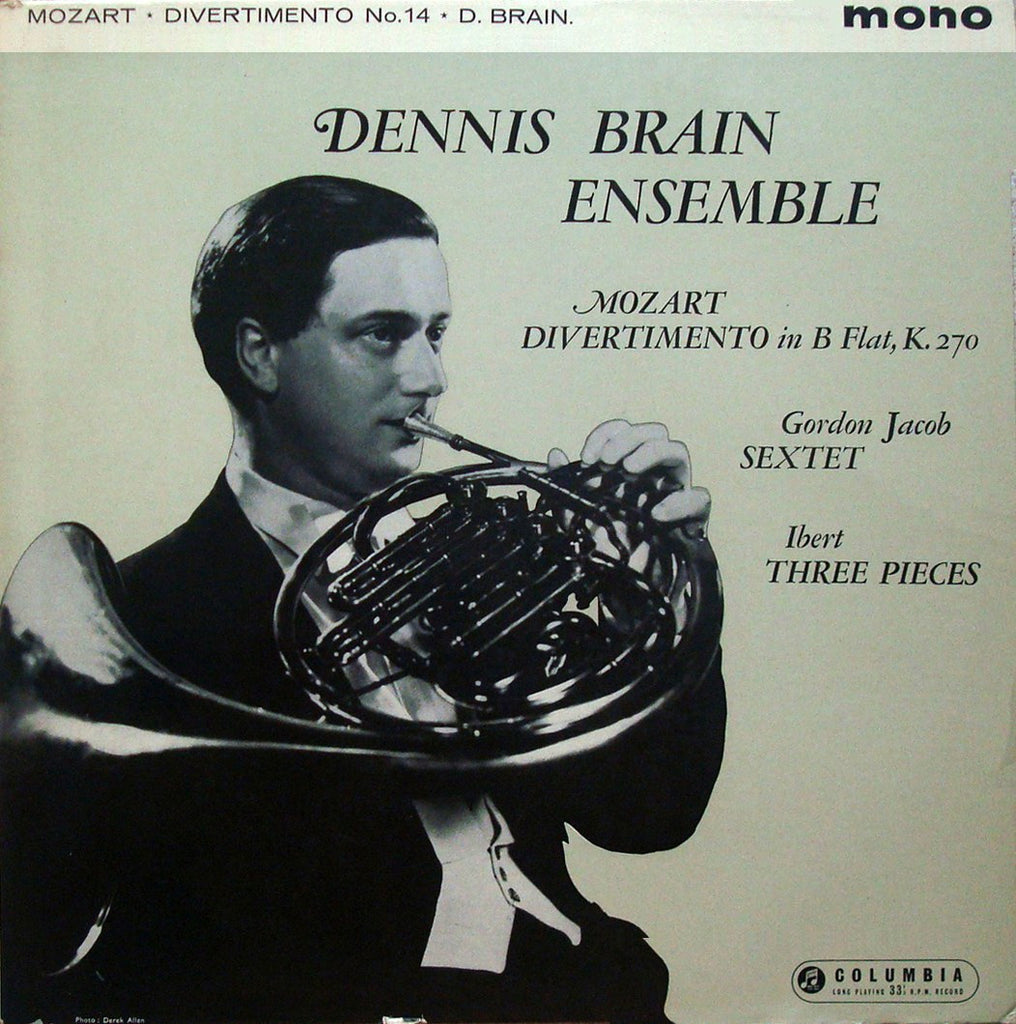Dennis Brain Ensemble: Mozart Divertimento K. 270, etc. - Columbia 33CX 1687
¥89.00
Jacket GOOD / LP NM / UK pressing
This outstanding LP from Columbia (33CX 1687, English EMI pressing, blue/gold label, mono – no stereo edition exists) features the Dennis Brain Ensemble in stunning “live” performances, first broadcast on 5 September 1957 (four day’s after Brain’s death), with “a royalty on the sale of this record…being donated to the Dennis Brain Scholarship Fund”.
The Dennis Brain Ensemble was comprised of:
Gareth Morris, flute
Leonard Brain, oboe
Stephen Waters, clarinet
Cecil James, bassoon
Dennis Brain, horn
George Malcolm, piano
The performances preserved on this LP include the following works:
Gordon Jacob: Sextet
Wolfgang Amadeus Mozart: Divertimento No. 14 in B-flat Major K. 270
Jacques Ibert: Trois Pièces Brèves for Wind Quintet
Wrote the critic M.M. in her review for the March 1960 issue of The Gramophone:
“With most British composers of comparable standing (and many foreign ones of considerably less) represented in our catalogues by at least a smattering of representative works, it is extraordinary that hitherto Gordon Jacob has been known to the gramophone library only as an arranger and as the author of some exotic variations on Annie Laurie. At last, now, some small part of his lucid, sane and always extraordinarily well laid-out music may be enjoyed on disc. The Sextet for wind and piano is a five-movement major work, declaring successively an Elegiac Prelude, a vivacious Scherzo, a slow funeral Cortège that is nevertheless kept firmly in motion, a consciously antique Minna and Trio, and a Rondo with a final elegiac Epilogue. The elegiac character of the whole stems from the original purpose of the work, written for the tenth anniversary concert of the Dennis Brain Ensemble in 1956, and dedicated to the memory of Aubrey Brain. This ascription has dictated as well as the general elegiac character some part of the sextet's thematic material; but the selection of the workable notes of Aubrey Brain's nameABEBA—is necessarily a selection in the manner of the ad hoc convenience of Schumann and Berg; really only Bach. whose name works properly, ought to be allowed to get away with this one.
“Nevertheless in the result the beauty and skill of Jacob's music betrays in no way its crossword origin, and the tribute to the leading horn-player of his age is most certainly one in which all gramophone-lovers of the older generation will concur.
“Those of the comparatively younger generation may perhaps feel more immediately concerned with the other memorial intention of the record, that of commemorating Aubrey's son, Dennis. His immaculate horn-playing may be heard contributing to all the music on the record; his colleagues, too, give every point not only to the Jacob, but also to the other pieces. The Mozart, originally for two oboes, two horns and two bassoons, sounds very well in Anthony Baines's adaptation. The division of the lead between flute, oboe and clarinet gives the idyllic music noticeably more variety of texture than the original scoring was able to produce. It would certainly need one of the severer purists to raise any serious objection to this alternative colouring being made available; even so, it does not quite fill the gap created by the deletion of the excellent Nixa disc of the original version of the music.
“The Ibert are joyous pieces ideally suited to the wind medium. They complete a disc which is a most useful addition to the repertory, and one which in the circumstances may be called well recorded. While the brilliance and presence of the best modern sound is of course not in evidence, yet by good fortune the broadcast performance from which the disc originates was itself a pre-recorded one, with the consequence that the quality of sound now given a wider distribution was at least entirely satisfactory. The new record can scarcely fail to contribute to our own pleasure; if in the process it also manages to contribute substantially to the Dennis Brain Scholarship Fund that, too, most surely be accounted yet one further point of recommendation.”
Incidentally, there is an eloquent and moving tribute to Brain on the reverse side of the jacket by the eminent Gramophone critic Lionel Salter (all texts in English only). The striking cover photo of Brain was taken by Derek Allen.
